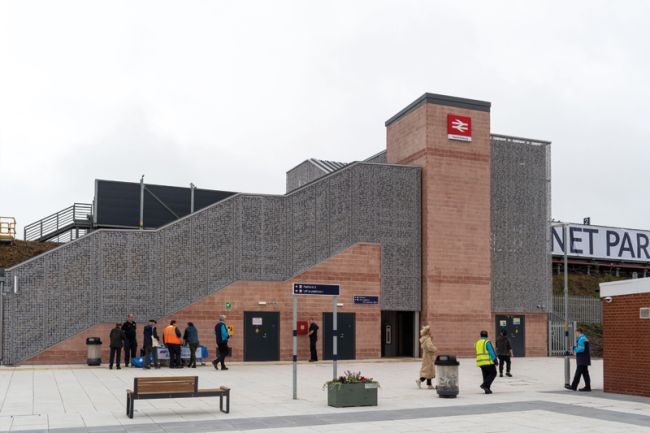Shaping the Future of Transport Planning
Last week I had the huge privilege to chair the Transport Planning Society (TPS) event ‘Shaping the future of Transport Planning.'

Last week I had the huge privilege to chair the Transport Planning Society (TPS) event ‘Shaping the future of Transport Planning’ hosted in Steer’s new eco-friendly London headquarters, Southworks.
The event had a fantastic woman-dominated panel that brought together Jessica Matthew, Co-director of Local Transport at the Department of Transport (DfT); Victoria Hills, Chief Executive of the Royal Town Planning Institute; and Steer’s very own new mobility guru (and chair of CoMoUK), Matthew Clark. These three industry experts came together to discuss what lies ahead for transport planners and others working in the built environment.
At the top of the event, I identified some of the huge challenges that transport planners need to contend with in a post-covid landscape. Foremost for the sector and surely in all our minds is the climate crisis and the pressing need to rapidly decarbonise transport. Secondly, how does transport planning fit into a funding and policy landscape which is dominated by pressing concerns over (among other things) the cost-of-living crisis, a brink-of-collapse health service, and lack of affordable housing? Finally, there were the ongoing after-effects of the pandemic and the lasting impacts on people’s lifestyles and travel needs, with a rapid acceleration in digital communication and home-working, and a rise in new mobility modes across our towns and cities.
All these challenges were addressed from different perspectives by our fantastic speakers and the enjoyable and lively discussion that followed their presentations.
Matthew focused her presentation on the importance of Local Travel Plans (LTPs) for decarbonisation and better integration of transport planning with planning for new housing, jobs, and services. Despite a statutory obligation for UK local authorities to develop LTPs, the plans have lapsed in recent years due to a lack of government oversight. Matthew hopes for a revival of LTPs (in part supported by devolution deals) and argues that, through the introduction of the quantified carbon reduction requirement, decarbonization will be central to all LTPs. While the DfT draft LTP guidance is in preparation, it isn't yet clear whether it will be released before or after the May local elections.
Building on the themes in Jessica’s presentation, Hills added that joining up land use and transport planning can positively affect both sustainability and health outcomes, and that we should promote the wider societal benefits of our work much more passionately. She highlighted the risks of not having current land use and transport plans in place, with developers using the presumption in favour of sustainable development to secure planning permission on greenfield and/or greenbelt sites, which are often in inaccessible locations with poor sustainable transport provision.
When it comes to decarbonisation of neighbourhood travel, Clark had plenty to say in terms of lowering car use through new technology. A quiet revolution is happening in the UK through the introduction of shared e-bikes, e-scooters, and cargo e-bikes (although there was some debate over the ability of new micro-mobility modes to reduce car use in the Q&A) and Clark was able to show that shared car services can bring down numbers of private vehicles in local neighbourhoods through research by CoMoUK.
The discussion focused heavily on funding, policy, and governance arrangements. Matthew pointed out that devolution deals unlock new and longer-term funding opportunities and enable wider geographies to be covered by LTPs. She advocated for LTPs to integrate the various other plans councils produce, such as bus service improvement plans, EV charging infrastructure strategies, and spatial plans. The plans could then occupy a middle space between these modalities and the councils’ Local Plans. Using LTPs to provide a stronger evidence base of the impacts of investment, the DfT also hopes to convince the Treasury to award multi-year funding, enabling better long-term planning. A clear LTP strategy in place also supports better tactical decision-making, enabling local authorities to exploit unexpected opportunities when they arise.
Hills was emphatic in her description of a complex policy framework made even more difficult by the myriad breeds of local authority and funding pots that exist in the UK, as well as the political instability we have seen in recent years. Pointing towards the benefits reaped from the joined-up approach in London, and the benefits of an integrated London Plan and Mayor’s Transport Strategy, Hills argued for such powers to be granted to metro mayors in locales like Liverpool and Sheffield. In the same vein, Hills highlighted the possibilities for increased cash and borrowing powers through devolution. Finally, she argued for better communications on what planners do to capture the public imagination and to push planning up the funding agenda. An increase in funding would have the added benefit of preventing loss of planners to the private sector (capacity within the planning and transport professions was a recurring theme throughout the event).
Clark made some excellent points about the lack of congruence between the public and private sector in terms of service use and spatial planning, as well as a need to reframe how we discuss subsidy and investment surrounding public transport. Shared mobility and public transport have the potential to complement each other and provide a realistic alternative to car ownership, which will be crucial in tackling transport carbon emissions.
Overall, the event was a huge success, with around 250 people attending in-person or online. The event recording will be available soon for those who missed it, and we hope it offers inspiration to transport planners and other built environment professionals across the country to think about what they can do in 2023 to tackle the urgent environmental and socio-economic challenges we are all facing.
Watch the online recording in full below.
https://www.youtube.com/watch?v=JQp-4tEA7Q8
























